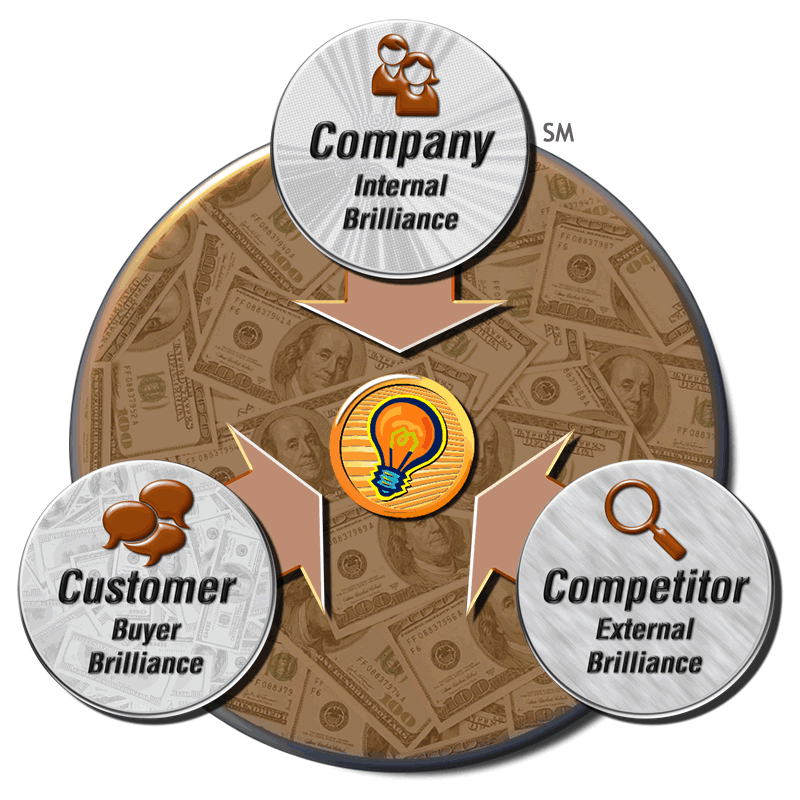Don't OVERPAY for That Business You Want to Buy. Use Our Fresh Eyes to Discover Negotiation Bargaining Points to Get a Much Better Price
- Jul 16, 2024
- The Big Innovations Team
- Columbus, Ohio

BUYING A BUSINESS: SOURCING, DUE DILIGENCE, VALUATIONS, INTEGRATION, ETC.
There are many reasons to consider buying a business. An entrepreneur can find acquisition of an established company a much-lower-risk play compared to starting a company from scratch. A company may buy out a competitor for gains in market share by elimination of a strong competitor. A popular strategic thrust involves buying & integrating companies to diversify and grow. And so on.

An established company typically comes with:
- existing customer & lead pools,
- a functional & refined business model(s),
- market credibility, history & reputation,
- products or services already at market,
- cash flow from the moment you take ownership,
- a team fully capable of continuing to cover their roles when you take over. And sometimes these teams are hungry to spread their wings and grow the business in ways that the former ownership would not support,
- an owner that can be motivated to play a cooperative role in the transition, perhaps even offering some financing options superior to what you can get elsewhere,
- infrastructure, sometimes reasonably up to date,
- efficient and scalable assets with some tangible value,
- etc.
A new startup must try to put all of that (and more) together from scratch. Two opposing viewpoints...
| HALF FULL | HALF EMPTY |
| A from-scratch approach is an opportunity to do EVERY bit of this right. | There will be MANY challenges in smoothly transitioning this into a win. |
Whether you are a "half full" or "half empty" entrepreneur, buying a company does come with many advantages. You can always leverage your own innovations along with exceptional customer & competitor research to build upon an established foundation SOONER than having to first build out a similar foundation from scratch.
BUSINESS BUYER CHECKLIST: CRUCIAL MUSTS TO DO IT RIGHT
As a prospective business buyer, there are many things you want to accomplish & understand. We can help you with ALL of these... even do most of this FOR you...
- Document your key reason(s) for wanting to buy a business. Write it down so you can refer back to it again and again as you progress through the process. Consider it the focal point- even criteria- to which the rest of the process must adhere. Be sure the reason(s) and the targeted business(es) are closely associated with what you like to do, your core competencies, etc.
This exercise should not be complicated, nor should the process be lengthy. It’s about maintaining a point of focus rather than allowing the process to dynamically manipulate your reasoning on the fly. It shouldn’t take more than a few minutes for you to develop your own answer to the question. Do it! And refer back to it often. - Thoroughly analyze the business you want to buy- especially all of the core revenue drivers, finances, debt and legal obligations, documentation & constraints- to be sure it will look as appealing on the other side of the transaction. Find the skeletons- there's always at least a few. Finding them usually means a LOWER buying price. It's extraordinarily important to look and look and look again. If you can't find them, we can.
In a process called due diligence, you should objectively verify that it will continue to produce after the sale. Ideally, you want to notice real opportunities to make changes that will ramp up the growth curve.
Be mindful of the less sexy aspects that don’t show in revenue & profit forecasts. For example, in looking at legal commitments & obligations, is the business locked into a long-term lease at a specific location and does the landlord have any say over anything you might want to do there once you take over? Inconsequential details to sellers can become big issues for new owners. - Identify & consider similar alternatives. You never get a great price if you are focused on only ONE target. Lining up some alternatives gives you bargaining power. It also helps you walk away if the deal ultimately demanded exceeds your pre-determined limit. One of the biggest buyer mistakes is falling in love with just ONE target. It ALWAYS yields a price much higher than necessary.
- Does the targeted acquisition have a planning culture? If so, completely review their business plans: past, present & future. Are they a "fly by the seat of their pants" company or one that has a proven track record of planning and executing to their plan? If the:
- latter, verify that those who will remain AFTER the transaction can maintain and grow business performance.
- former, be sure the owner who is about to depart isn’t the central dispatcher that holds it all together.
This is crucial, as "seat-of-the-pants" operations are often that way by design... because an egomaniac owner can’t bear to delegate away company dependencies on themselves. This is where to gauge stability of the organization, explore employee turnover activity and the reasons for that turnover, management team quality (and be sure to gather their thoughts about the sale) and so on. - Put yourself in the seller’s shoes. You need to richly grasp their perspective to help you do the best job in the coming negotiations.
- Their primary task is to jack up the asking price.
- Your primary task is to minimize that price.
The better you can anticipate their moves, the easier it will be to counter. You also need to get a firm hold on what- beyond the money- is important to the seller. These can be ancillary cards to play to help win a better deal. Be sure to understand WHY they want to sell (don’t assume) and also why they want to sell NOW. Understand the concept of seller "puffery" in everything they present. - Treat the seller fairly and cordially. If it is all take and no give on your part, the seller can always toss you out. While you know you don’t have to buy their business, it’s equally important to recognize that they are not obligated to sell it to you. In their goal to maximize and your goal to minimize, both parties must strive to find the appropriate middle ground. Else, both are likely to waste a lot of time & money to accomplish nothing.
Also, realize that while there should be little-to-no business pricing influence from the sweat equity they put into launching and growing the business to this point, you are buying their baby... sometimes their life's work. You see the present & future of the business more like an investment while they thoroughly recall all that had to be done in the past to get it to this point. All that history may have up to no bearing on what the business can yield going forward but it will weigh heavily in how the seller perceives the valuation. Some of their personal identity is likely associated with it. - Objectively consider variables like competitive landscape, industry trends, company history, credibility & reputation. Be sure the business also looks good to customers, prospects, suppliers, vendors and other stakeholders.
- Clearly map out your value add. Exactly how can your acquisition yield growth? At the same time, be very (even overly) conservative in your first-year projections.
No matter how well the transition is planned, there is still a transition to undertake. They always come with lots of distractions, learning curves, etc. Hitting the ground running is an excellent target going in but it’s best to plan for some crawling in that first year. It’s often a good idea to initiate little-to-no changes at first in order to smooth out the initial transition. - Work out any financing you may need to execute the transaction. Don’t make the very common mistake of spending all of your cash on the transaction and having little-to-none left as operational cash to use during the transition. All businesses- new or purchased- need the fuel of working capital to backstop operations. Cash shortages can be very painful immediately after taking the reigns.
- Throughout, be sure to treat the employees as the most valuable asset of the business. It’s very likely that the team the seller leaves behind will be the ones charged with keeping everything running smoothly during the transition and beyond. Many of them (high & low in the organization structure) may play important roles in training you or your staff on various aspects of the company.
Don’t alienate them. Don’t give them reasons to believe (or perceive) that their jobs are history as soon as the company changes hands. Don’t breed resentment by implying that you (as an outsider) already know more about the business and how to do their jobs than they do. Etc. Very simply... - Be mindful of the opportunistic seller who plots to have all of the key business metrics maxing out right when they are trying to make the sale. This typically involves throwing all of the fuel they have on the fire so it glows as bright as possible- tactics like forward booking sales, running big promotions to win additional transactions now, avoiding any infrastructure investments, delaying HR costs, etc. Such moves can make it look like you are buying into a very hot business roaring toward even greater success.
However, THAT fire is usually more of a moth-to-the-flame ploy. For example, if they’ve used major promotions and heavy discounting to motivate their prospects & customers to buy now- earlier than what might be a natural pace of sales- what are you going to be able to do AFTER you take ownership to drive some more sales? - Is there any way for you to plug yourself into the business for a while (even covertly, as if you were hired as a new executive) to get a chance to more thoroughly examine the business in a day-to-day capacity AS AN INSIDER? There is so much opportunity to absorb crucial knowledge in a day-to-day engagement... much more than you can possibly accomplish in any outsider-looking-in position.
- Be patient. In business buying, a hurried fool and his money is very easily parted. Assume there are many skeletons in this closet and thoroughly go through every closet. Some enthusiastic & naive buyers get into some misconceptions about needing to
 be agile, else the business might get purchased by someone else ready to move now.
be agile, else the business might get purchased by someone else ready to move now.
There are plenty of fish in this sea and you can always fall back to creating your own fish from scratch if necessary. A high-pressure, hurried seller is usually hiding something. You had better find out what it is BEFORE you take ownership.
TIP: If you conduct enough discovery that you feel pretty confident, but still want some more time for further review, you can always negotiate an exclusive buyer option which basically involves paying a premium for the exclusive right to buy the company at a predetermined price by or before a fixed point in time.
For example, you might use an exclusive buyer option to give you 3 more months to complete the review & analysis. If- EVERYTHING comes out to your satisfaction, you exercise your option and buy the company.
- ANYTHING makes you want to nix the transaction, you let your option expire with no further obligation.
With an exclusive option to buy, you lock in the selling price and prevent anyone else from swooping in and getting the company while you finish your due diligence. This applies even if someone else offered the owner a higher price than you've established in the option. By selling you the option, the owner is obligating themselves to sell you the business at the set price if you exercise your option. They cannot cancel the option because some other buyer has shown up and offers them more. - Etc. There are many more, but hopefully the above sampling gives you confidence that engaging our team to help you with your acquisition evaluation is a very shrewd move. Our team can help you do it all right.



the staff that is left behind by the seller is much of the bridge to your future success with this acquisition. Treat them accordingly. In many ways, THEY may be MOST of the value in what you are buying.

Big Innovations (BI) is uniquely skilled with core competencies in all of the growth-oriented aspects of business:
- marketing & digital marketing,
- sales,
- business development: new product • website • technology,
- subscription & membership models and
- strategic planning & execution.
We mostly work in the customer-facing, sales-driving, record-breaking business departments.
As such, we can very capably help you look at a company’s business model, offerings & customer touch points and arm you with objective knowledge and recommendations related to valuing the business. Proven talent in our network of quality subcontractors can cover the rest of the due diligence analysis, thoroughly screening the financials, legals, infrastructure, etc.
In a nutshell...
We can help you both identify the weaknesses to drive down the price range AND the better opportunities you can build upon AFTER you take over.
You can also use us to source good candidates and alternatives so that you can fluidly move on to another prospective buy should one seller become overly rigid or greedy. BI can do up to all of the heavy grunt work necessary to:
- develop a clear & complete picture of the company you want to buy,
- recommend the price range you should consider and
- the specific terms & conditions of the ultimate deal.
When the deal is done, BI can continue to help in the transition period, especially in communications, managing change and evolving solutions to enhance company growth. Our proven expertise in all of the growth-side functions can yield many ways to quickly leverage your new company towards record revenue & profits. Contact us for a FREE CONSULTATION
How about a view from the OTHER side of the transaction? When buying or selling, a super-smart thing to do is to swap perspectives. While we referenced that in #5 up above, we have a whole article much like this one but in support of business sellers. Taking a look in that "mirror" can add to your buying insights...













